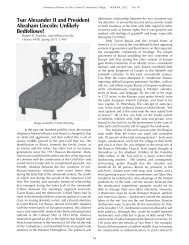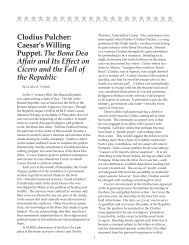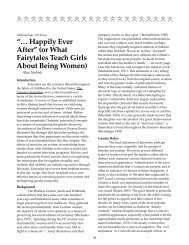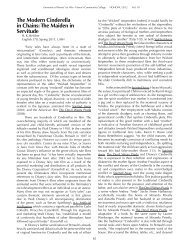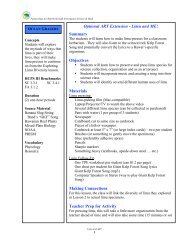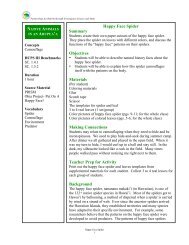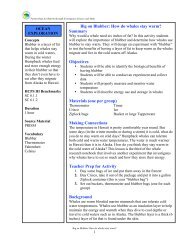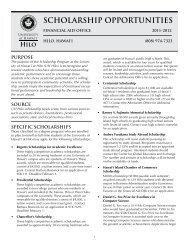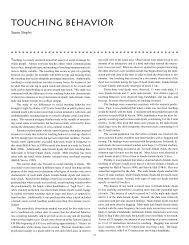A JOURNAL OF ACADEMIC WRITING VOLUME 8
A JOURNAL OF ACADEMIC WRITING VOLUME 8
A JOURNAL OF ACADEMIC WRITING VOLUME 8
Create successful ePaper yourself
Turn your PDF publications into a flip-book with our unique Google optimized e-Paper software.
d d d d d d d d d d d d d d d d d d d d d d<br />
The Fruit of Good and<br />
Evil<br />
Richard Wei<br />
English 100T<br />
Twenty five hundred miles southwest of the Hawaiian<br />
Islands lay the islands of Samoa. Once under the rule of<br />
monarchy, the islands are now two dissimilar political entities.<br />
To the east is the United States territory of American Samoa,<br />
initially Eastern Samoa. West of American Samoa is the<br />
Independent State of Samoa, often referred to as Western<br />
Samoa. Although politically divided, the two nations are<br />
homogeneous. Both speak the same language and share the<br />
principles of the fa’a Samoa (Samoan way): the traditions and<br />
customs that govern the Samoan people. The fa’a Samoa creates<br />
a hierarchy that has placed the Samoan culture in a position<br />
impossible to either overcome or destroy, or at least from<br />
outside influence. While the fa’a Samoa completely shields off<br />
foreign influences that threaten to change the Samoan culture,<br />
its oppressive means of governance has spurred discontent from<br />
Samoans. Should change come upon the Samoan culture, it will<br />
likely begin from its own people.<br />
The acceptance of Christianity by King Malietoa of Samoa<br />
apparently left quite the impact on the Samoan culture. After<br />
being presented with a copy of the Holy Bible, King Malietoa<br />
conferred the salutation aofa’alupega (head of all titles, even<br />
to the title Malietoa) to the first missionaries. From then on<br />
church ministers have always inherited the prestige of the<br />
nation. They possess dominant power. Their intelligence is<br />
acquiescence.<br />
Samoans believe, through church ministers, families are<br />
blessed and at times, families are cursed. Yearning for blessings,<br />
Samoans serve by giving food and monetary donations to<br />
the church minister and family: “[s]ome villagers may even<br />
be pressured to contribute more than thirty percent of their<br />
income to support local pastors and church projects – a burden<br />
increasingly resented by many” (Governing Body of Jehovah<br />
Witness 69).<br />
Resentful people, however, are told that they have failed to<br />
serve God when they forget to give, or just couldn’t afford to.<br />
Some face public humiliation. Monetary donations collected for<br />
church ministers and for church improvements are recited so<br />
the congregation is informed of who donated and who did not.<br />
To avoid shame, families must give. Though the wealthy in this<br />
case are rarely affected, the poor are greatly distressed. Raised<br />
in a religious family, I have experienced firsthand the burdens<br />
of religious institutions. As an illustration of my family, both<br />
parents worked minimum wage jobs in American Samoa, raised<br />
six children, and served the church, in this case, a Methodist<br />
one.<br />
Like most of the older generation, my parents have vowed<br />
their commitment to the church though I am uncertain when<br />
our service began. I must believe, however, that our service<br />
began years before I was born, and lasted long enough that<br />
before anyone is to eat, the best portion of the meal must be<br />
put aside and taken immediately to the church minister and his<br />
family. On Sundays, half of our family income is handed over<br />
and is recorded by the church secretary; the amount is then<br />
tallied together with other donations and announced before<br />
the congregation; individual families are called out and all<br />
donations are disclosed.<br />
We were considered part of the low-givers at church,<br />
however. Our donations did not even compare to the wealthy<br />
as “there are even competitions to see who can give the most.<br />
Some churches announce the names of winners who can give<br />
the most money” (Governing Body 69).<br />
On average, a church minister makes about three thousand<br />
dollars a month in cash, all of which are tax free. Aside from<br />
the income, “the pastor’s house is the largest in the village,<br />
provided for him…by the villagers themselves” (Swaney<br />
27). Also provided are food and many other services, all to<br />
accommodate who the Samoans claim as the suli vaai’a a le<br />
Atua, roughly translated as “the Seen One of God.” My family,<br />
amongst others, feels the existence of oppression in any religious<br />
institution is unacceptable and should be changed (Swaney 27).<br />
Many have questioned the influence and the credibility<br />
of certain denominations of Christianity that are found in<br />
the Samoan culture. The latter generations have called the<br />
denominations in question “a business.” Some say it is the<br />
ideal job. Parents still demand that their children become<br />
church ministers. The truth is that many “ordinary citizens<br />
are controlled by…religious institutions,” and because of<br />
this, according to Andre Vltchek, a journalist on Asian and<br />
South Pacific foreign policy, “out-migration has increased and<br />
Samoans leave for more than just economic reasons” (6-7).<br />
Advocates of the various churches in Samoa, conversely,<br />
argue that people suffer because of their little faith, and hence<br />
they could not withstand the faith. While this may seem<br />
reasonable because barely anyone understood Christianity as it<br />
first established on the islands, anthropologist Lowell Holmes<br />
HOHONU Volume 8 2010 - 83



